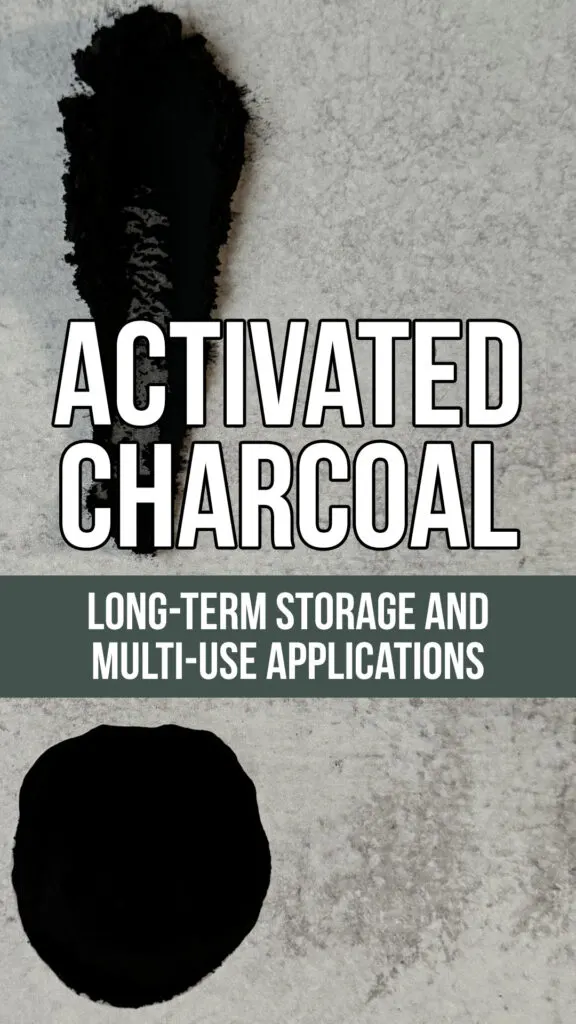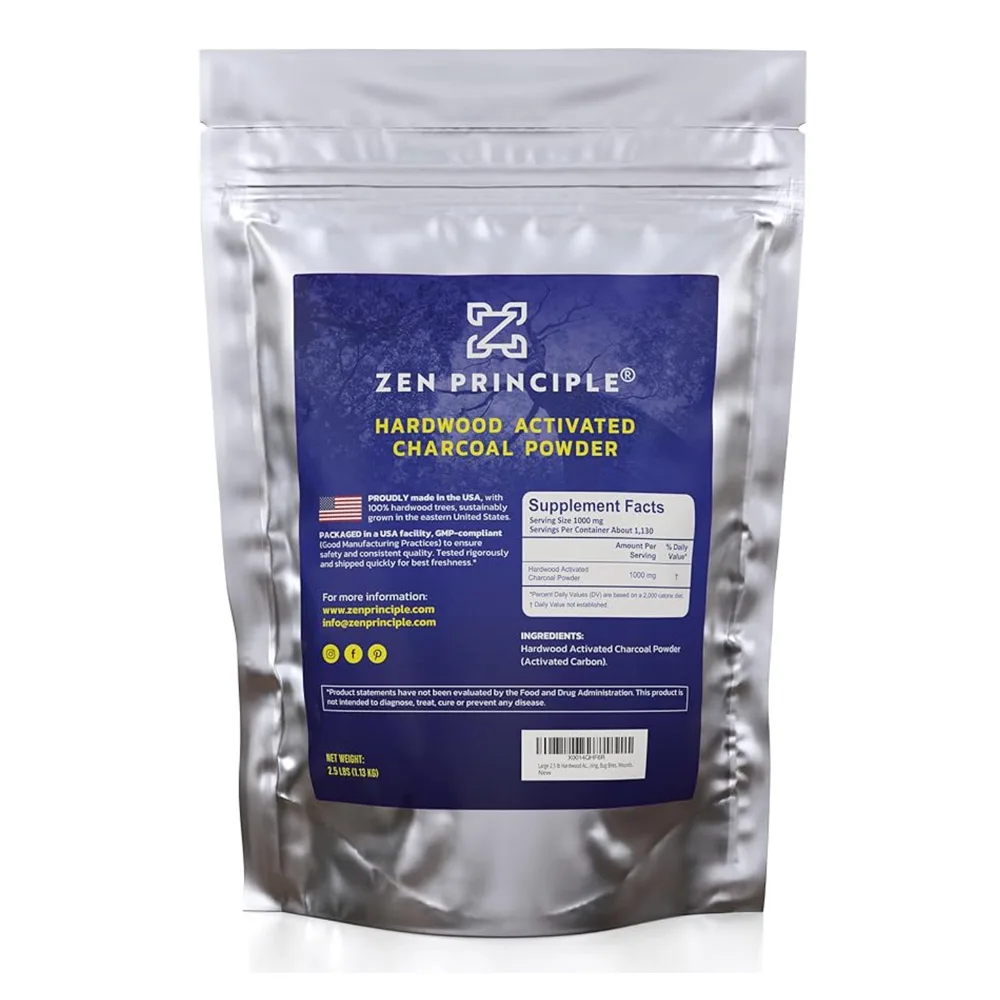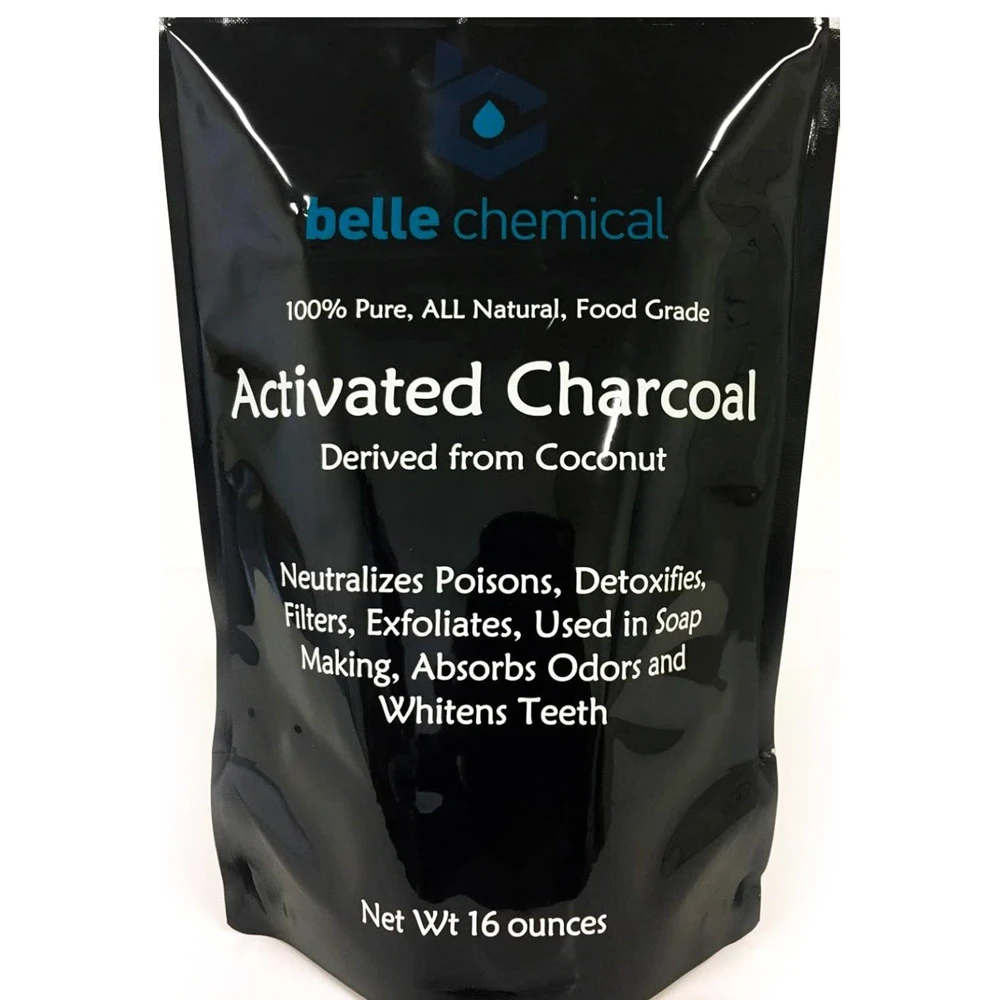Activated charcoal is a versatile tool for health, preparedness, and everyday practical use. Its ability to adsorb toxins and serve multiple functions makes it indispensable for anyone focused on self-sufficiency and long-term solutions. Here’s what you need to know about activated charcoal.
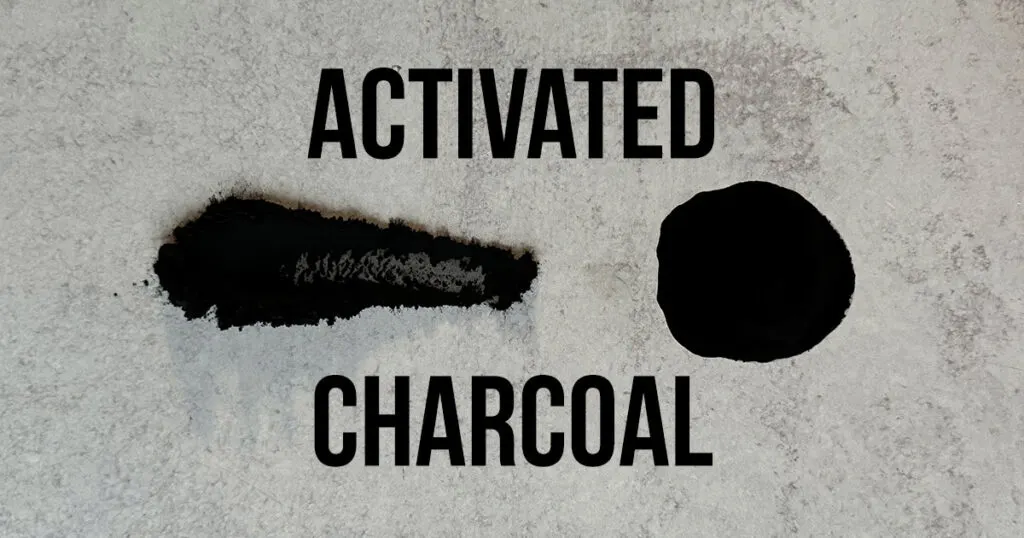
- What is Activated Charcoal?
- How Does Activated Charcoal Work?
- Key Benefits of Activated Charcoal
- DIY Water Filtration System: Step-by-Step Guide
- Emergency Detox Applications
- Long-Term Storage of Activated Charcoal
- Historical and Modern Success Stories
- Activated Charcoal and Gut Health
- Limitations and Precautions
- Why Activated Charcoal Belongs in Your Preparedness Plan
Listen on Spotify (or wherever you listen to Podcasts) – Search: How to Prepare w/ Rob Benson. You can also view ALL Podcasts here.
What is Activated Charcoal?
Activated charcoal is a fine black powder made by heating organic materials such as coconut shells, olive pits, or coal at extremely high temperatures. This process, known as “activation,” expands its surface area and creates tiny pores that trap toxins. The result is a highly effective substance for binding unwanted materials in both emergency and everyday situations.
Charcoal vs. Activated Charcoal
Charcoal and activated charcoal are distinct in their properties and uses:
Charcoal:
- Commonly used as a fuel source for grilling or heating.
- Made by burning wood or other organic materials in low-oxygen environments.
- Contains fewer pores and has a much smaller surface area.
- Not suitable for ingestion or medical purposes due to impurities and limited adsorptive capacity.
Activated Charcoal:
- Specially processed at high temperatures to “activate” it by expanding its surface area and reducing pore size.
- Designed for adsorbing toxins, chemicals, and impurities in medical and environmental applications.
- Pure and safe for use in health, emergency detox, water filtration, and odor control.
In essence, activated charcoal is a refined and enhanced version of regular charcoal, optimized for applications that require powerful adsorption properties.
How Does Activated Charcoal Work?
Activated charcoal works through a process called adsorption, where molecules adhere to the surface of the charcoal rather than being absorbed into its structure. This unique property allows activated charcoal to trap toxins and impurities effectively, making it an essential tool for a variety of applications. Once bound, these toxins are safely eliminated from the body, typically through bowel movements.
Key Benefits of Activated Charcoal
Health Benefits
- Reduces gas and bloating: Adsorbs gas-producing compounds in the digestive system, providing quick relief from discomfort. Take 1-2 tablespoons mixed with water as needed. (gut health)
- Supports kidney function: Binds to toxins like urea, helping to reduce the burden on the kidneys. Use 1 tablespoon daily. (limitations and precautions)
- Promotes gut health: Adsorbs harmful endotoxins and supports a balanced digestive system. Take 1-2 tablespoons as needed. (gut health)
- Provides relief from leaky gut symptoms: Binds irritants in the gut lining, reducing inflammation and discomfort. Take 1 tablespoon daily. (gut health)
- Alleviates diarrhea: Adsorbs bacteria and toxins that cause diarrhea, helping to restore balance. Mix 1-2 tablespoons with water.
Emergency and First Aid Uses
- Emergency detox: Adsorbs drugs and toxins in the stomach before they enter the bloodstream. Administer 50-100 grams within 30 minutes of ingestion. (dosage for detox applications) (Effective and Ineffective Uses of Activated Charcoal)
- Cleans wounds: Adsorbs bacteria and toxins from open wounds, reducing infection risk and odor. Apply a paste of charcoal and water directly to the wound.
- Treats insect bites and stings: Adsorbs toxins injected by bites or stings, alleviating pain and swelling. Apply a charcoal paste immediately to the affected area.
Practical Applications
- Filters water: Removes impurities such as chlorine, sediment, and some toxins, improving taste and safety. Use activated charcoal in DIY or commercial filtration systems. (DIY Water Filtration System: Step-by-Step Guide)
- Reduces mold exposure: Adsorbs airborne mold spores and toxins, offering relief from exposure symptoms. Take 1 tablespoon with water after exposure.
- Removes pesticides: Adsorbs pesticide residues on fruits and vegetables when used in a rinse solution. Wash produce in water mixed with approximately 1 teaspoon of powdered charcoal per quart.
- Adsorbs odors: Traps odor-causing molecules in confined spaces, keeping shoes, closets, or refrigerators fresh. Use loose charcoal or charcoal-infused pads.
- Purifies air: Adsorbs volatile organic compounds (VOCs) and allergens, improving indoor air quality. Place activated charcoal in air purifiers or enclosed spaces.
Beauty and Hygiene
- Enhances oral hygiene: Adsorbs plaque and tannins, whitening teeth and improving oral health. Add a small amount (1/8 teaspoon) to toothpaste or apply directly and rinse thoroughly.
- Improves skin health: Adsorbs bacteria, oils, and impurities that cause acne and skin infections. Use as a mask or paste directly on problem areas. Mix 1 teaspoon of charcoal with water or your chosen skincare product.
DIY Water Filtration System: Step-by-Step Guide
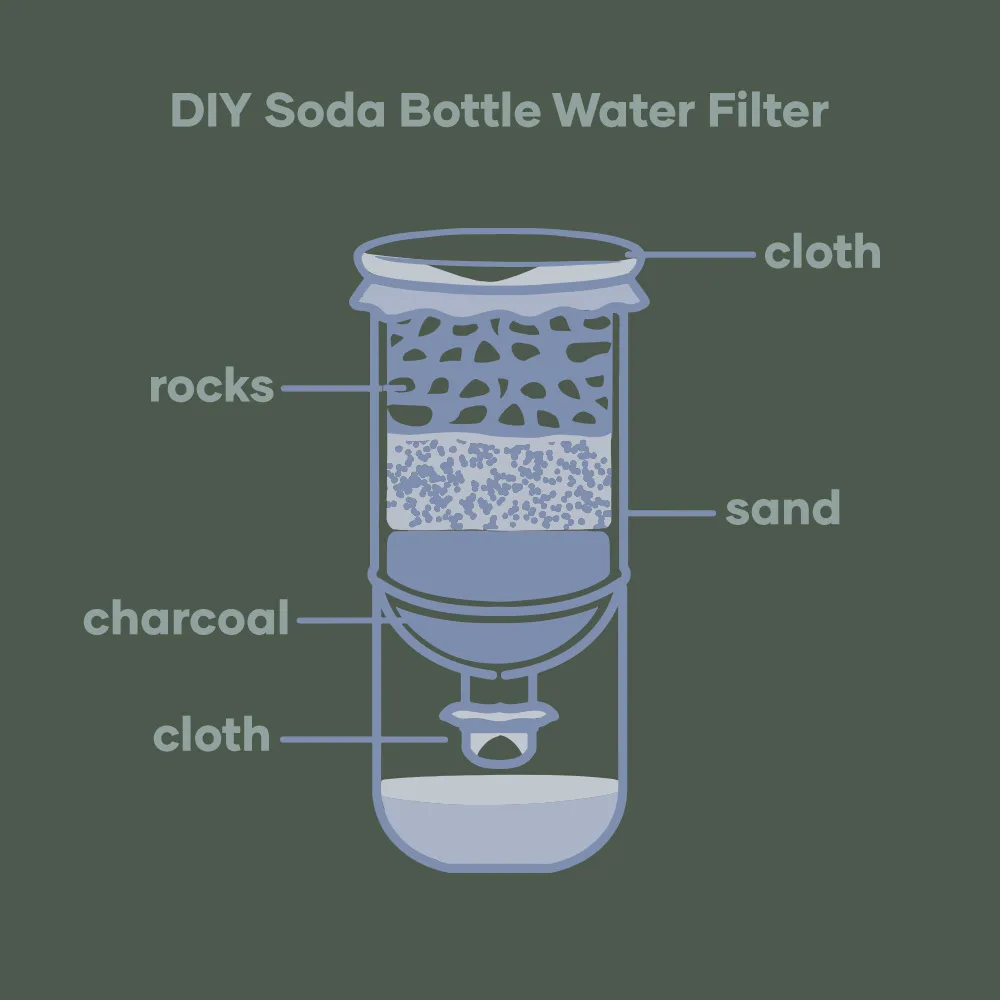
Materials Needed:
- Plastic soda bottle (cut in half)
- Cloth or coffee filter
- Activated charcoal (powdered or crushed)
- Sand (coarse and fine, if possible)
- Small rocks or gravel
- Container to collect filtered water
Instructions:
- Cut the Bottle:
- Cut a plastic soda bottle in half. Use the top half as your filter.
- Prepare the Neck:
- Place a piece of cloth or coffee filter in the bottle’s neck to prevent materials from falling through.
- Layer the Filter:
- Add layers in this order:
- Bottom Layer: Activated charcoal (adsorbs toxins and chemicals).
- Middle Layer: Sand (removes fine particles).
- Top Layer: Rocks or gravel (catches larger debris).
- Add layers in this order:
- Assemble:
- Place the top half of the bottle (with layers) upside down inside the bottom half to catch filtered water.
- Filter the Water:
- Pour unclean water into the top. Let it flow through the layers into the bottom container.
- Repeat if Needed:
- For better results, filter the water multiple times or boil it after filtration for drinking.
Emergency Detox Applications
In cases of toxin ingestion, activated charcoal can be a lifesaver. A single dose of 50-100 grams, taken within minutes of exposure, can significantly reduce toxin absorption. Effectiveness decreases the longer you wait, dropping from 74% effectiveness at 5 minutes to 20% after 3 hours. It’s a trusted solution for accidental poisonings, chemical exposures, and even some overdoses.
Position Paper: Single-Dose Activated Charcoal
Effective and Ineffective Uses of Activated Charcoal
Activated Charcoal is Effective For:
- Drug Overdoses: Activated charcoal is well-documented to adsorb drugs like acetaminophen, aspirin, and some sedatives, as supported by clinical toxicology guidelines (e.g., American Academy of Clinical Toxicology).
- Most drugs begin to absorb into the bloodstream within 30-60 minutes of ingestion.
- Administering activated charcoal within 30 minutes significantly reduces the amount of drug absorbed.
- Effectiveness decreases sharply after 1 hour.
- Chemical Poisoning: It is effective against certain chemicals (e.g., pesticides, herbicides) that are large enough to bind to the porous structure of charcoal.
- Similar to drugs, many chemicals remain in the stomach for 30-60 minutes before absorption. Administering activated charcoal within this window yields the best results.
- Food Poisoning: Known to bind bacterial toxins, reducing symptoms like diarrhea and nausea.
- Bacterial toxins and some foodborne toxins stay in the stomach longer than synthetic chemicals, so activated charcoal can still be somewhat effective even beyond 30 minutes.
- However, earlier administration is always better.
- Poisonous Plants/Berries: Helps adsorb plant-based toxins from ingestion.
- Plant-based toxins often have slower absorption rates, giving a slightly longer window for effectiveness.
- However, the 30-minute rule still applies for maximum efficacy.
- Pharmaceutical Errors: Used in medical settings to prevent further absorption of excess or incorrectly taken medications.
- Similar to overdoses, activated charcoal is most effective within the first 30 minutes to 1 hour, as many medications absorb quickly.
Activated Charcoal is Not Effective For:
- Alcohol Poisoning (Ethanol): Ethanol (alcohol) and similar small molecules (e.g., methanol, ethylene glycol) are not adsorbed by activated charcoal because they do not bind well to its surface. This is confirmed by toxicology studies, which show that activated charcoal has limited or no impact on alcohol poisoning.
- Heavy Metals: Substances like iron, lead, and mercury do not bind to activated charcoal. Chelation therapy is typically required for these toxins.
- Strong Acids and Alkalis: Caustic substances such as bleach or hydrochloric acid are chemically reactive and not adsorbed by charcoal. Treatment for these cases involves dilution and immediate medical attention.
Dosage for Detox Applications
- Measure the Dose: Adults should take 50-100 grams; children should take 10-25 grams.
- Mix with Water: Combine the dose with 1-2 cups of water. Stir until fully dissolved.
- Drink Quickly: Consume immediately for maximum effectiveness.
- Stay Hydrated: Follow with a full glass of water to aid digestion and prevent dehydration.
- Important: Activated charcoal works best within 30 minutes of exposure. For serious cases, contact poison control or seek medical help immediately.
How many tablespoons of activated charcoal should an adult take for emergency detox?
Answer: An adult should take 5 to 10 tablespoons of activated charcoal powder, depending on the density of the product, to approximate 50-100 grams.
Everyday Uses of Activated Charcoal
Activated charcoal isn’t just for emergencies. Here are some practical ways to incorporate it into your daily routine:
- Travel kit for food or water contamination: Take 1-2 tablespoons mixed with water as needed.
- After dining out to counteract toxins: Take 1 tablespoon mixed with water shortly after eating.
- After alcohol consumption to reduce hangover symptoms: Take 1-2 tablespoons mixed with water before bed or the next morning.
Long-Term Storage of Activated Charcoal
Activated charcoal’s effectiveness depends on proper storage, especially for long-term use. Here are essential tips to ensure it remains viable:
- Use Airtight Containers: Opt for glass jars with tight seals, food-grade stainless steel canisters, or high-quality BPA-free plastic containers. These materials prevent air and moisture from degrading the charcoal.
- Control Moisture Exposure: Include desiccant packs to manage humidity and keep the charcoal dry.
- Store in a Cool, Dry Location: Choose areas away from direct sunlight and temperature fluctuations to preserve its potency.
- Clear Labeling: Label containers with the contents and storage date for easy identification, especially during emergencies.
By following these practices: Organizing and Protecting Long-Term Chemical Compounds
Historical and Modern Success Stories
Activated charcoal has been a trusted remedy for centuries, with its versatility proven time and again in critical situations.
- Ancient Uses: Ancient Egyptians used charcoal to purify water and heal wounds, recognizing its detoxifying properties.
- 2008 Songhua River Contamination (China): After a chemical explosion polluted the river, activated charcoal was used to filter toxins from drinking water, preventing fatalities and saving countless lives.
- Medical Endorsements: Healthcare organizations like the NHS and the American Academy of Clinical Toxicology recommend it for treating severe poisoning and overdoses.
- Cholera Epidemics: During the 19th century, activated charcoal was used to treat diarrhea and dehydration caused by cholera outbreaks.
- NASA Applications: Activated charcoal is used in air filtration systems on spacecraft to ensure breathable air for astronauts.
- Mold and Chemical Exposures: Modern homeowners and environmental cleanup teams use activated charcoal to adsorb toxic molds and chemicals, reducing exposure risks.
Activated Charcoal and Gut Health
For those seeking digestive relief, activated charcoal is a solid choice. It adsorbs gas and endotoxins, alleviating symptoms like bloating and discomfort. Beyond internal use, its odor-adsorbing properties make it useful in clothing, pads, and even shoes.
Activated Charcoal & Sodium Bicarbonate
Do activated charcoal and sodium bicarbonate complement each other or interfere with each other when taken together?
Activated charcoal and sodium bicarbonate (baking soda) generally complement each other rather than conflict when used together, especially for digestive relief. Their mechanisms of action are distinct yet synergistic:
- Activated Charcoal: Works by adsorbing toxins, gases, and other unwanted substances in the gastrointestinal tract, preventing their absorption into the bloodstream.
- Sodium Bicarbonate: Functions as an antacid, neutralizing excess stomach acid and reducing acidity in the digestive system.
When combined, sodium bicarbonate can create a more neutral pH environment in the stomach, potentially enhancing the efficacy of activated charcoal by reducing the irritation caused by high acidity. This can be particularly beneficial for addressing bloating, indigestion, and mild gastrointestinal discomfort.
Potential Considerations of the Combo:
- Timing of Use: To avoid any reduction in effectiveness, sodium bicarbonate should ideally be taken slightly before (15 min) activated charcoal to allow it to neutralize stomach acid first. This ensures the charcoal can focus on adsorbing toxins and gases.
- Specific Conditions: If you are managing a condition like acid reflux, sodium bicarbonate might address acid issues, while activated charcoal focuses on toxins or gases.
- Individual Variability: Some individuals may react differently, so it’s wise to monitor effects when combining these remedies.
Limitations and Precautions
While activated charcoal offers numerous benefits, it’s essential to use it wisely:
- Overuse can lead to nutrient depletion, as it may adsorb vitamins and minerals along with toxins.
- Always consult a useful and trusted healthcare professional for serious medical concerns.
- Understand its limitations; it’s not effective against all toxins, such as heavy metals, alcohols, strong acids, or alkalis. Additionally, it may not work for substances that are rapidly absorbed into the bloodstream or those requiring targeted medical treatments, like cyanide or lithium. Activated charcoal is most effective for certain ingested drugs and chemicals when administered promptly, but it should not be relied on as a universal solution for poisoning or toxicity.
Why Activated Charcoal Belongs in Your Preparedness Plan
Activated charcoal is a must-have for anyone serious about being ready for everything. Its ability to store long-term, combined with its multiple uses, makes it a practical and cost-effective solution. Whether you’re filtering water, managing digestive discomfort, or responding to an emergency, this versatile tool is an invaluable addition to your supplies.
From health benefits to emergency preparedness, activated charcoal is a cornerstone of practical, self-managed solutions. Add it to your storage today and unlock its full potential for tackling a wide range of challenges.
Pin it
